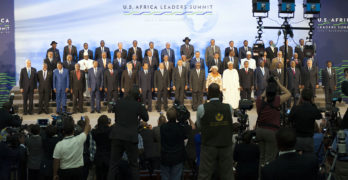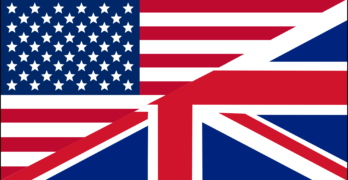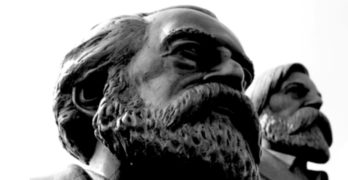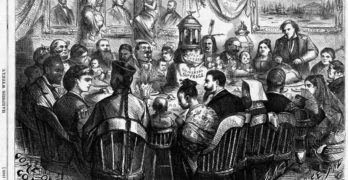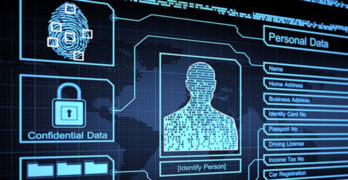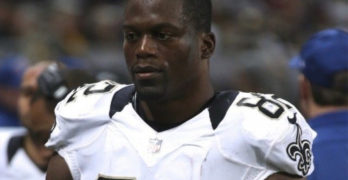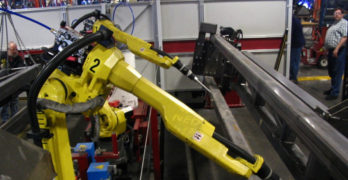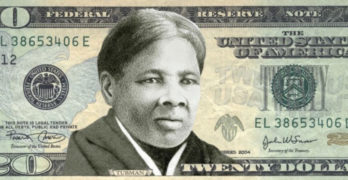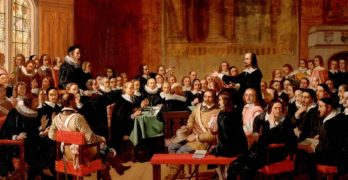 E.M. Bounds said more in various passages that relate to the theme of the Holy Spirit. We need to listen again to some of the fiery clarity of this prophet of prayer:
E.M. Bounds said more in various passages that relate to the theme of the Holy Spirit. We need to listen again to some of the fiery clarity of this prophet of prayer:
Preachers of the present age excel those of the past in many, possibly in all human elements of success. They are well abreast in the age of learning, research and intellectual vigour. But these things neither insure “power from on high” nor guarantee a live, thriving religious experience, or righteous life. These purely human gifts do not bring with them an insight into the deep things of God, or strong faith in the Scriptures or an intense loyalty to God’s divine revelation.
The presence of these earthly talents even in the most commanding and impressive form, and richest measure do not in the least abate the necessity for the added endowment of the Holy Spirit. Herein lies the great danger menacing the pulpit of today. All around us we see a tendency to substitute human gifts and worldly attainments for that supernatural, inward power which comes from on high in answer to earnest prayer.
Many Church leaders seem to think if they can be prominent as men of business, of money, influence, of thought, of plans, of scholarly attainments, of eloquent gifts, of taking, conspicuous activities, that these are enough, and will atone for the absence of the higher spiritual power which only much praying can give.
Natural ability and educational advantages do not figure as factors in this matter; but a capacity for faith, the ability to pray, the power of a thorough consecration, the ability of self-degeneration, an absolute losing of one’s self in God’s glory and an ever present and insatiable yearning and seeking after all the fullness of God (see Ephesians 3:14-21).
God’s revelation of Himself and His will cannot be sought and understood by reason, intelligence or great learning. Great men and great minds are neither the channels nor depositories of God’s revelation by virtue of their culture, braininess, nor wisdom.
God’s system in redemption and providence is not to be thought out, open only to the learned and wise. The learned and wise, following their learning and their wisdom have always sadly and darkly missed God’s thoughts and God’s ways (see Luke 10:21-22).
The Gospel Flows Through Hearts
The condition of receiving God’s revelation and of holding God’s truth is one of the heart, not of the head. The ability to receive and search out is like that of a child, the babe, the synonym of docility, innocence and simplicity. These are the conditions on which God reveals himself to men. The world by wisdom cannot know God. The world by wisdom can never receive nor understand God, because God reveals Himself to men’s hearts, not to their heads.
Only hearts can ever know God, can feel God, can see God, and can read God in His Book of Books. God is not grasped by thought but by feeling. The world gets God by revelation, not by philosophy.
It is not apprehension, the mental ability to grasp God, but plasticity, ability to be impressed, that men need. It is not by hard, strong stern, great reasoning that the world gets God or gets hold of God, but by big, soft, pure hearts. Not so much do men need light to see God as they need hearts to feel God (see Acts 17:26-28).
Human wisdom, great natural talents, and the culture of schools, howsoever good they be, can neither be the repositories nor conservers of God’s revealed truth. The tree of knowledge has been the bane of faith, ever essaying to reduce revelation to a philosophy and to measure God by man.
In its pride, it puts God out and puts man into God’s truth. To become babes again, on our mother’s bosom, quieted, weaned, without clamor or protest, is the only position in which to know God. A calmness on the surface and in the depths of the soul, in which God can mirror His will, His Word and Himself— this is the attitude toward Him through which He can reveal Himself, and this attitude is the right attitude of knowing God intimately in prayer.
Men are called to pray. God regards the man in so important a way as to put a kind of discount on all else. Men have built him glorious temples and have striven and exhausted themselves to please God by all manner of gifts; but in lofty strains he has rebuked these proud worshipers and rejected their princely gifts (Isaiah 66:1-2; John 4:24)
We have emphasized sermon-preparation until we have lost sight of the important thing to be prepared—the heart. A prepared heart is much better than a prepared sermon. A prepared heart will make a prepared sermon. Volumes have been written laying down the mechanics and taste of sermon- making, until we have become possessed with the idea that this scaffolding is the building.
The young preacher has been taught to lay out all his strength on the form, taste, and beauty of his sermon as a mechanical and intellectual product. We have thereby cultivated a vicious taste among the people and raised a clamor for talent instead of grace, eloquence instead of piety, rhetoric instead of revelation, reputation, and brilliance instead of holiness. By it we have lost the authority over consciences and lives which always results from genuine preaching.
It would not do to say that preachers study too much. Some of them do not study at all; others do not study enough. Numbers do not study the right way to show themselves approved of God (see 2 Timothy 2:15).
But our great lack is not in head culture, but in heart culture; not lack of knowledge but lack of holiness is our sad and telling defect—not that we know too much, but that we do not meditate on God and His Word and watch and fast and pray enough.
The heart is the great hindrance to our preaching. Words pregnant with divine truth find in our hearts non-conductors; arrested, they fall shorn and are powerless.
Can ambition, which lusts after praise and place, preach the gospel of Him who made Himself of no reputation and took on Him the form of a servant? Can the proud, the vain, the egotistical preach the gospel of Him Who was meek and lowly?
Can the bad-tempered, passionate, selfish, hard worldly man preach the system that seems with long-suffering, self-denial, tenderness, which imperatively demands separation from enmity and crucifixion to the world? Can the hireling official, heartless, perfunctory, preach the gospel that demands the shepherd to give his life for the sheep?
Can the covetous man, who counts salary and money, preach the gospel till he has gleaned his heart and can say in the spirit of Christ and Paul in the words of Wesley:
I count it dung and dross; I trample it under my feet; (yet not I, but the grace of God in me) esteem it just as the mire of the streets, I desire it not, I seek it not?
God’s revelation does not need the light of human genius, the polish and strength of human culture, the brilliancy of human thought, the force of human brains to adorn or enforce it; but it does demand the simplicity, the docility, humility, and faith of a child’s heart.
It was this surrender and subordination of intellect and genius to the divine and spiritual forces that made Paul peerless among the apostles. It was this that gave Wesley his power and radicated his labours in the history of humanity. Our great need is heart-preparation. We do not say that men are not to think and use their intellects; but he will use his intellect best who cultivates his heart most. The heart is the Savoir of the world. Heads do not save. Genius, brains, brilliancy, strength, natural gifts do not save. The gospel flows through hearts (Acts 2:36-39).
Revivals Are Born in Prayer
As God from the beginning, has wrought prominently through revivals, there can be no denial of the fact that revivals are a part of the divine plan. The kingdom of our Lord has been advanced in large measure by special seasons of gracious and rapid accomplishment of the work of conversion, and it may be inferred, therefore, that the means through which God has worked in other times will be employed in our time to produce similar results. The quite conversion of one sinner after another, under the ordinary ministry of the gospel,” says one writer on the subject:
must always be regarded with feelings of satisfaction and gratitude by the ministers and disciples of Christ; but a periodical manifestation of the simultaneous conversion of thousands is also to be desired, because of its adaptation to afford a visible and impressive demonstration that God has made the same Jesus, Who was rejected and crucified, both Lord and Christ; and that, in virtue of His divine mediatorship, He has assumed the royal scepter of universal supremacy and “must reign till all enemies be made His footstool.” It is therefore, reasonable to expect that, from time to time, he will repeat that which on the day of Pentecost formed the conclusive and crowning evidence of His Messiahship and Sovereignty; and, by so doing, startle the slumbering souls of careless worldliness, gain the attentive ear of the unconverted, and, in a remarkable way, break in those brilliant dreams of earthly glory, grandeur, wealth, power, and happiness, which the rebellious and God-forgetting multitudes so fondly cherish. Such an outpouring of the Holy Spirit forms at once a demonstrative proof of the completeness and acceptance of his once offering of Himself as a sacrifice for sin, and a prophetic “earnest” of the certainty that He shall” appear the second time without sin unto salvation. “to judge the world in righteousness.
All revivals are dependent on God, but in revivals, as in other things, he invites and requires the assistance of man, and the full result is obtained when there is cooperation between the divine and the human.
God alone can save the world, but God chooses not to save the world alone. God and man unite for the task, the response of the divine being invariably in proportion to the desire and the effort of the human.
This cooperation, then, being necessary, what is the duty which we, as co-workers with God, require to undertake? First of all, and most important of all—the point which we desire particularly to emphasize—we must give ourselves to prayer.
“Revivals,” as Dr. J. Wilbur Chapman reminds us, “are born in prayer. When Wesley prayed, England was revived; when Knox prayed Scotland was refreshed; when the Sunday school teachers of Tannybrook prayed, 11,000 young people were added to the church in a year. Whole nights of prayer have always been succeeded by whole days of soul-winning.” And when we pray, God will revive again.






